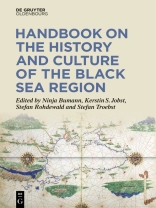Following the annexation of Crimea by the Russian Federation in spring 2014 – 160 years after the Crimean War – and the full-scale invasion of Ukraine in February 2022, the Black Sea region has again become the focus of world history. In this handbook, international scholars from various historical and cultural disciplines provide deep historical insights into the structures of conflict, cooperation, and interrelations between the Balkans, the Middle East, the Caucasus, and Eastern Europe in the space referred to as the Black Sea world. The trans-maritime communication and intra-regional circulations, spanning from Antiquity to the present day via, Byzantium, the Polish-Lithuanian Commonwealth, the Crimean Khanate, the Venetian, Safavid, Ottoman, and Romanov empires, two World Wars, and the Cold War, highlight the autonomy of this historical region in the larger transcontinental setting – designated in various times and varying languages as the Pontus Euxinus, the Mare Maggiore, the Kara Deniz, the Chernoe More, or the Black Sea.
‘This voluminous edition sheds real light upon the history of the Black Sea region from antiquity until the end of the 20th century. Not only does this first-rate book provide a host of excellent historical essays across time, it also devotes considerable attention to important questions regarding how the Black Sea region is conceptualized and theorized. A very useful contribution.’ (James H. Meyer, Montana State University)
‘In the wake of several research projects, monographs and journals, this is the first groundbreaking handbook on the cohesive history of the Black Sea as a historical meso-region. It gathers 39 excellent contributions that provide the conceptual apparatus, survey the history of the region from a Greek to Byzantine to Ottoman lake, to conflicting rivalries, to its recent transformation from a quasi-Soviet to a quasi-NATO lake, examine the ideas that underpin the various national, ethnic and religious identities, research the different mobilities through migration, transport,
infrastructure, and take stock of its turbulent history through conflicts and war.” (Maria Todorova, University of Illinois at Urbana-Champaign)
‘Mostly the work of scholars from Central Europe and the Black Sea region, this massive volume focuses on the relationship between historical research and memory, in particular the difficulty of certain groups living in the region when confronted with empires and nation states, whose centers may be quite distant from the Black Sea. Attentive readers may thus view the present handbook not merely as a work of reference on history, memory and movement, but also as a testimony to the historical perspectives developed by a significant number of Central European and Black Sea scholars during the first quarter of the twenty-first century.’ (Suraiya Faroqhi, Ibn Haldun University, Istanbul)
Inhoudsopgave
1. Introduction
• The Black Sea area as a ‘historical region’
Stefan Troebst
• ‘Black Sea World’ – The Black Sea as a sphere of circulation
Eyü Överen
• The Black Sea region as a natural space
Jörg Stadelbauer
2. Chronological Overview
• Antiquity
David Braund
• Byzantium, Khazars, the Golden Horde and others
Stefan Albrecht
• The Ottoman Empire, the Crimean Khanate, Poland-Lithuania, Persia and others
– Northern Black Sea area
Dariusz Kołdziejczyk
– Southern Black Sea area
Kenan İan
• The Russian Empire, the Ottoman Empire etc.
Kerstin Jobst
• Interwar Period until World War II
Adrian Brisku
• Era of bloc confrontation and its dissolution
Etienne Peyrat
3. Ideas and Identities
• Regional concepts
Zaur Gasimov
• Nation Building
– Northern Black Sea area
Dennis Dierks
– Southern Black Sea area
Elke Hartmann
• Religious Identities
– Religious developments in late Antiquity and the Middle Ages (4th– 15th centuries)
Johannes Preiser-Kapeller
– Christianity
Nikolas Pissis, Stefan Rohdewald
– Islam and Judaism
Hannah Müler-Sommerfeld
• Memory spaces
– Northern Black Sea area
Liliya Berezhnaya
– Southern Black Sea area
Nicole Kançl-Ferrari
• Myths and legends
Zaal Andronikashvili
• Literature
– (Not only) Russian Literature on the Topic of the Northern Black Sea Area
Helena Ulbrechtová, Siegfried Ulbrecht
– Literature on the Black Sea in the Southern Black Sea Area
Mehmet Fatih Uslu (To be confirmed.)
– Georgian Literature on the Black Sea
Zaal Andronikashvili (To be confirmed.)
4. Mobility and Transfers
• Migration
Istvá Vááy and Andrew Robarts
• Slavery
Christoph Witzenrath
• Travelling and tourism in the Black Sea Region (approx. 1500 until present times)
Yavuz Köe
• The Formation of the Black Sea Economy (late 18th– 19th centuries)
Gelina Harlaftis, Alexandra Papadopoulou
• Education and scholarship (18th– 21st centuries)
Dominik Gutmeyr
• Transport technologies and infrastructure
Florian Riedler and Reinhard Nachtigal
5. Violence, Conflict and Conflict Resolution
• Pirats and Bandits
Albrecht Fuess and Arkadiusz Blaszczyk
• Naval History
Tuncay Zorlu
• Crimean War (1853–1856)
Mara Kozelsky
• The Eastern Question
Dietmar Müler, Adamantios Skordos
• World War I
Onur İşç
• Ethnic violence and displacement in the context of World War I
Mihran Dabag
• World War II
Onur İşç
• Holocaust/Shoah
Mariana Hausleitner
• Deportations in the context of World War II
Rudolf A. Mark
• Territorial conflict after 1989 (Abkhazia, Crimea, South Ossetia, Transnistria)
Jan Zofka
Over de auteur
N. Bumann, Justus-Liebig-Universität Gießen,
K. Jobst, Universität Wien,
S. Rohdewald und
S. Troebst, Universität Leipzig.












